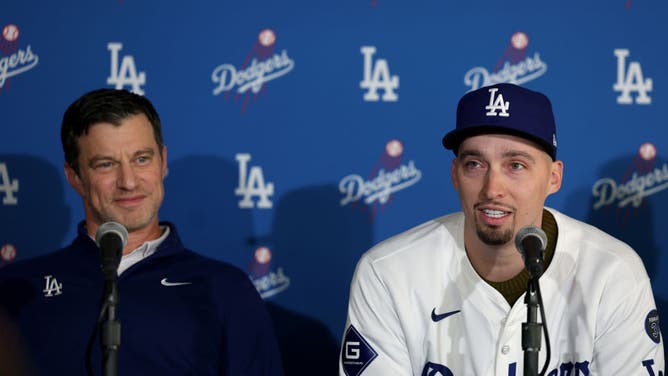Los Angeles Dodgers Contract Deferrals Reach Astronomical New Highs
For going on two decades, teams across Major League Baseball have been searching for the new market inefficiency. The Moneyball era ushered in a wave of new, analytics-driven front offices that realized the value of getting on base, high velocity, spin rates, and exit velocities. The Los Angeles Dodgers might have discovered what that next market inefficiency is: deferred money.
On Tuesday afternoon, the Dodgers held their introductory press conference with their latest high-priced, high-profile free agent, Blake Snell.
Snell agreed to a 5-year, $182 million contract with Los Angeles recently, but buried in the details was the fact that Snell and his agent Scott Boras had accepted roughly $66 million in deferred money to be paid out in the 2030's. That figure sent the Dodgers to an eyewatering $1 billion in deferred money owed to players stretching out into the 2040's.
And the real question is, why isn't every team doing this?

LOS ANGELES - Blake Snell and Andrew Friedman react during a press conference introducing Snell as a Los Angeles Dodger at Dodger Stadium on December 3, 2024. (Photo by Harry How/Getty Images)
Dodgers Using Deferred Money To Build Superteam
The vast majority of the deferred money is owed to Shohei Ohtani, who the team has already said actually turns a profit for them thanks to the outside advertising and marketing dollars he brings in. Still, that leaves another $320+ million in salaries to pay through the next 20 years.
It's a lot, and fans of opposing teams are furious that it's seemingly allowed the team to lock up talent. But what they should be furious about is that their teams aren't doing it too.
Deferred money is part of the CBA negotiated between the players and owners; it's completely legal and entirely up to the organization and individual player. It's just that the Dodgers are one of the few teams to take advantage of it.
Guggenheim Partners, the company that owns the Dodgers, is an investment house. The company has correctly assessed that with the savings in actual dollars going out the door each year on salaries now, it can invest that money and make a higher rate of return than the money it'll owe later on. In short, if the company invests that $1 billion now and in the next few years, it'll more than cover what it owes in the 2030s and 2040s with the profits.
Any team could do this, but the Dodgers ownership group is confident in continuing to own the team into the near, and distant, future. Other owners want the ability to sell without financial constraints, leading to concern over long-ranging deferred money deals.
They're too scared to follow the Dodgers' example.
Yes, LA is building a super team by constructing contracts this way. But all the other teams could do it too. If they were brave enough, that is.